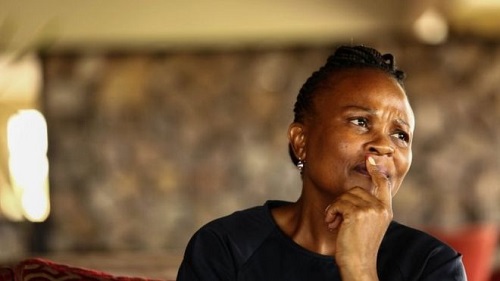
South Africa’s corruption watchdog is making headlines for all the wrong reasons.
Just three years into the job, there have already been two attempts to remove Busisiwe Mkhwebane from office. She has faced public scrutiny, accusations of political bias and has most recently become the subject of a scathing finding by the country’s constitutional court.
The latest of her controversies is a ruling by the country’s highest court that the lawyer lied under oath and acted in bad faith – and should pay a fine for her dishonesty. It follows a protracted legal battle between her office and South Africa’s reserve bank.
This is not her first run-in with the courts – which is odd for someone whose very responsibility is upholding the law.
A number of Ms Mkhwebane’s major investigations have recently been overruled by the courts in South Africa. They have said her findings were “invalid” and “unconstitutional”.
This has raised concerns about her fitness for office and questions about whether she has somehow become a pawn in a far larger political game.
Now aged 49, Ms Mkhwebane was born in Bethal, a small town in Mpumalanga province in eastern South Africa, bordering Eswatini and Mozambique.
She holds a law degree from the University of Limpopo, a diploma in corporate law and a higher diploma in tax from the University of Johannesburg. In 2010, she completed a masters in business leadership from the University of South Africa. In other words, the advocate is well educated.
Her experience in government institutions spans over two decades – she has worked as a researcher, investigator, advocate for refugee rights and an immigration counsellor at the South Africa embassy in China. All seemingly without much controversy.
She was appointed to the office of public protector in 2016, beating 13 well-qualified candidates, including a former judge, to the job.
The interviews were televised and consisted of a grueling interrogation by a parliamentary panel that included members of the opposition parties as well as officials from the ruling African National Congress (ANC).
The transparency of the process was supposed to ensure that the person appointed to this critical institution held no political bias.
By all accounts, her appointment suggested that Ms Mkhwebane had passed the test.
Her candidacy was endorsed with an overwhelming 263 votes during a debate in the 400-member National Assembly on 7 September, 2016. –BBC






